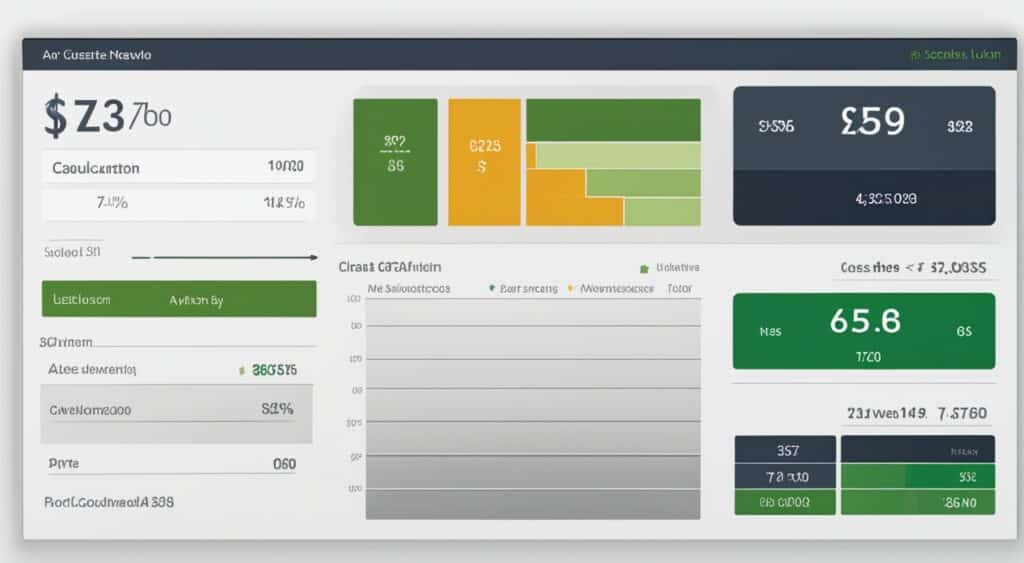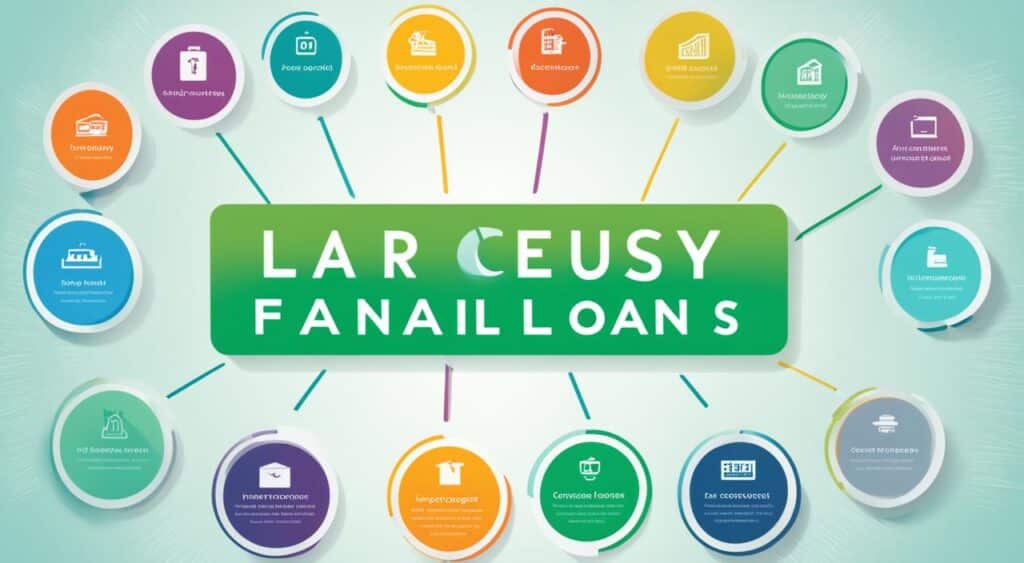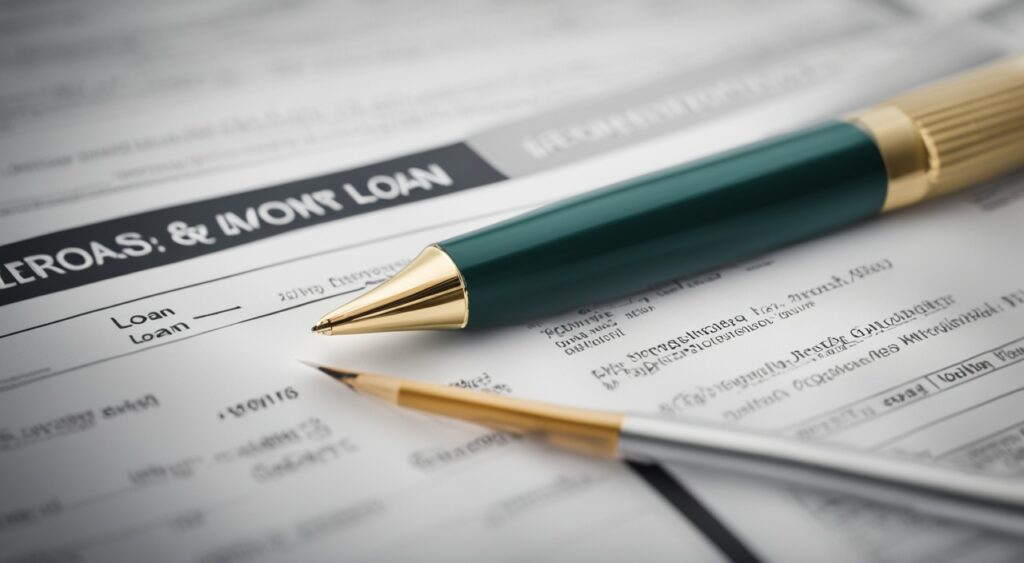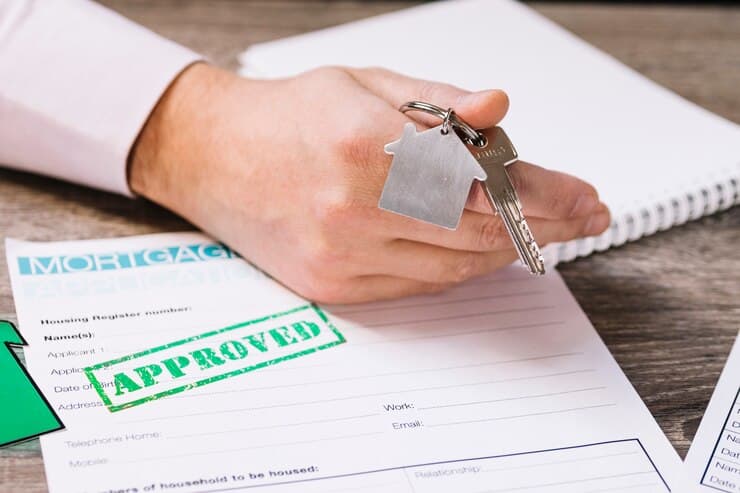Getting your loan approved is key to reaching your money goals, like handling a surprise cost or buying something planned. The personal loan market is here to help, offering fast money and a chance to pick what kind of loan you want. But, the way to loan approval can seem hard, with lenders looking at your credit score, income, and debt-to-income ratio.
To up your chance of loan success, it pays to know what lenders are after. Start by checking your credit and figuring out how much you need to borrow. Then, take a close look at what lenders expect and shop around smartly. This approach will help you be ready to apply with confidence, finding the best loan for you.
Key Takeaways
- Your credit score is critical for getting a loan, so learn how to boost it.
- Calculating the right loan amount can lead to better terms.
- It’s key to know what lenders look for to secure approval.
- Comparing deals from various lenders is crucial for your financial health.
- Understanding the loan terms and closing steps is vital for a smooth loan process.
Check Your Credit Score
Your credit score matters a lot when you want a loan. It shows lenders your trustworthiness. With a high score, you get better terms like lower interest rates. But, a low score might mean paying more in interest or not getting the loan at all chances of getting a loan.
Why Your Credit Score Matters
Your credit score tells a story about your borrowing past. It helps lenders guess if you’ll pay back a loan. If you have a good score, lenders see you as reliable. This makes it easier to get loans with great terms loan terms range.
Factors Affecting Your Credit Score
Many things can change your credit score. How you’ve paid bills, your credit card use, how long you’ve had credit, and if you’ve applied for new credit all matter. But, paying bills on time is the most important. Try to keep credit card use low too approval decision.
Lenders like to see you’re not maxing out your credit cards. It’s best to use less than 30% of what you could borrow choose the best personal.
Ways to Improve Your Credit Score
Want to boost your credit score? Start by paying your bills when they’re due. Also, try not to use too much of your credit limit. This simple step can help a lot personal loan lenders offer.
Plus, don’t apply for new credit too often. Too many applications can make your score drop temporarily. You might also want to check out Experian Boost. It can raise your FICO score by taking your utility and streaming service bill payments into account positively.
Calculate How Much You Need to Borrow

When getting a personal loan, know your exact loan amount need. This affects the interest rate, monthly payment, and fees. Be aware of origination fees from the lender too qualify for a loan.
Using a Personal Loan Calculator
A personal loan calculator is great for figuring out your monthly payment. It looks at the loan amount, interest rate, and loan terms. You can adjust amounts and times to fit your budget home improvement loan.
Picking the right loan amount is important for your budget. Think about what you can afford. Use a personal loan calculator to see what options are best for you.
Loan Approval Requirements and Documentation

Lenders look at many things when you ask for a personal loan. They check your credit score, how much you owe compared to what you earn, your total income, and if you really are who you say you are hard credit inquiry. Knowing about these needs will make it easier for you to apply for a loan.
Credit Score and Credit Report
Most lenders need you to have a decent credit score. They also check your credit report for big problems like bankruptcies. Your credit score shows how good you are at managing credit. So, keeping your credit history clean is key.
Debt-to-Income Ratio
Your debt-to-income ratio matters a lot to lenders. It’s about your monthly debt payments compared to how much you earn. They want to be sure you can pay back the loan without struggling too much.
Income Verification
You need to prove how much you make to lenders. They might ask for pay stubs, tax info, or bank statements. It’s important to give them the right paperwork when you apply.
Proof of Identity and Address
You have to show who you are and where you live. This could mean handing over things like a driver’s license or utility bills. It’s part of making sure you’re a real person with a real home.
Some loans ask for something valuable to be used as a guarantee. This is called a secured loan. The lender checks this item’s value to decide if they can give you the loan. Having someone with good credit co-sign your loan can also help you get approved.
Consider Your Personal Loan Options

Personal loans help with many money needs, like sudden costs or debt combining. Think about how quickly you need money. Also, consider if you aim to do better with money long-term.
Fast Funding vs. Future Planning
Some loans can get you money within one day. This is good for sudden needs. But, if you’re thinking ahead, like for a home’s down payment, a personal loan for debt merging might be wiser. It can better your credit, potentially making future loans easier to get.
Short-Term vs. Long-Term Loans
These loans can be from 1 to 7 years long. Short loans have lower rates but need more each month. Merging debts can simplify payments and help you get rid of costly credit card debt.
Debt Consolidation Considerations
Considering different loans for merging debts is wise. You could use home equity loans or borrow against assets like retirement. Each choice has good and bad points. So, think about your situation and goals well.
Get Prequalified with Multiple Lenders

Getting prequalified with many lenders helps you see different loan offers. Using a service like Experian’s tool makes this easy. It finds you offers from different lenders, using your credit history. This way, you can quickly see and compare things like interest rates and fees.
Prequalifying with several lenders shows you what loans you can get. It’s great if you’re not sure you’ll get a loan or you’re looking at different types of loans. Experian’s service matches you based on your specific financial details, which speeds up the process.
Compare Loan Terms and Lenders

After getting prequalified, it’s time to compare interest rates, origination fees, repayment terms, and lender reputation and customer service. This helps find the personal loan that matches your financial needs and budget.
Interest Rates and Fees
Pay close attention to the interest rates. They change based on your creditworthiness. Don’t forget about origination fees. They affect the APR and the total cost of the loan.
Repayment Terms
Think about the repayment terms. Longer loans offer lower monthly payments but cost more in overall interest over the life of the loan. Choose the schedule that suits your financial goals best and allows you to pay regularly.
Lender Reputation and Customer Service
Check the lender’s reputation and customer service history. This can affect your loan and repayment experience. Pick lenders known for their reliable and prompt help.
Choose a Lender and Apply

After you’ve checked out your personal loan choices, pick a lender and send in your loan application. You can do this on the lender’s website or by going to their office. Online lenders make it easy, while traditional lenders like banks and credit unions give hands-on help. No matter how you apply, you’ll need to show certain documents. These include your ID, proof of income, and where you live, as we talked about earlier.
Review the Loan Offer and Accept

After approval, the lender will send you a loan offer. This offer will explain everything about the loan agreement. It’s important to read and understand the loan terms. These include things like the interest rate, monthly payment, and repayment period.
Understand the Loan Agreement
Reading the loan agreement is vital before you decide. Look at the total loan cost, fees, and deadlines. Check if the deal fits your financial plan. Make sure you can keep up with monthly payments.
Accepting the Loan Offer
Happy with the loan offer? Think it works for you? Then, you can say yes to the loan. After that, the lender will give you the loan funds as you agreed.
Loan Approval Process

Once you say yes to the loan offer, the lender starts loan underwriting. This is a thorough check of your credit and if you have to put anything up for security. They might get an appraisal, title insurance, and look at other loan documentation too.
Underwriting and Decision
The credit evaluation part of underwriting helps the lender really look at your finances. They check your income, debts, and any security you’re offering. This process helps them set the right loan terms and decide if they’ll say yes or no to your loan.
Pre-Closing and Documentation
After underwriting and getting a green light, you move to pre-closing. Here, all the last loan documentation is put together. You might have to look over and sign different forms, disclosures, and more, needed by the lender.
Closing and Funding
The loan closing usually happens at the lender’s office, a title company, or with a lawyer. You sign off on the loan and other documents. Once it’s all done right, the lender hands over the loan funds. Then, you can use the money you borrowed.
Loan Approval Odds
Getting a personal loan approved depends on many things. Your credit score, debt-to-income ratio, and income level are key. Lenders like to see that you handle money well and that you have the means to pay back the loan.
Factors Affecting Approval Chances
To improve your approval chances, work on your credit score and keep your credit utilization low. It also helps to have a steady income and not too much debt compared to your income. Sometimes, pledging collateral or having someone co-signer can up your odds too.
Boosting Your Loan Approval Odds
If your credit needs work, start by getting your balances down and checking your credit report for errors. Always try to pay on time. These steps can really help improve your loan chances and the terms you get.
Also Read: What Is A Reverse Mortgage And How Does It Work?
Conclusion
Getting a personal loan involves many steps. First, check your credit score and how much you need to borrow. Then, look at different lender offers and apply. Understanding what lenders look at and improving your credit can help you get good loan terms.
It’s important to look at different options and pick the one that’s best for you. With good planning and knowledge of the process, you can get a loan that meets your goals. This can help you succeed financially in the long run.
Use the tips in this article to apply for a personal loan with confidence. This way, you can get the money you need for your dreams, like paying off debt, buying something big, or handling a surprise bill. The right approach can help you take charge of your finances.
FAQs
Q: How can I check my rate for a personal loan?
A: To check your rate for a personal loan, you typically need to fill out a loan application with a lender. They will then assess your information and credit history to provide you with a rate quote.
Q: What factors are considered in determining my monthly payment for a personal loan?
A: Your monthly payment for a personal loan is determined by factors such as the loan amount, interest rate, and loan term. Higher loan amounts, higher interest rates, and longer loan terms usually result in higher monthly payments.
Q: How do I improve my chances of getting approved for a personal loan?
A: To increase your chances of personal loan approval, you can work on improving your credit history, providing accurate information on your loan application, and demonstrating your ability to make loan payments on time.
Q: What is the application process like for a personal loan?
A: The application process for a personal loan typically involves filling out an online form, providing documentation such as proof of income and identification, and consenting to a credit inquiry by the lender.
Q: How can I boost my personal loan approval odds?
A: You can boost your personal loan approval odds by improving your credit score, reducing your debt-to-income ratio, and choosing a loan amount and terms that align with your financial situation.
Q: Can personal loans be used for any purpose?
A: While personal loans offer flexibility, the loan proceeds cannot be used for all purposes. Some common uses of personal loans include debt consolidation, home improvements, and unexpected expenses.
Q: How do I find the best personal loan for my needs?
A: To find the best personal loan, compare offers from different lenders, consider factors such as interest rates and fees, and choose a loan that meets your financial goals and repayment capabilities.
Source Links
- https://farmcreditcfl.com/resources/article/5-basic-steps-loan-approval-process
- https://www.experian.com/blogs/ask-experian/personal-loans-what-to-know-before-you-apply/
- https://www.bankrate.com/loans/personal-loans/how-to-get-personal-loan/





